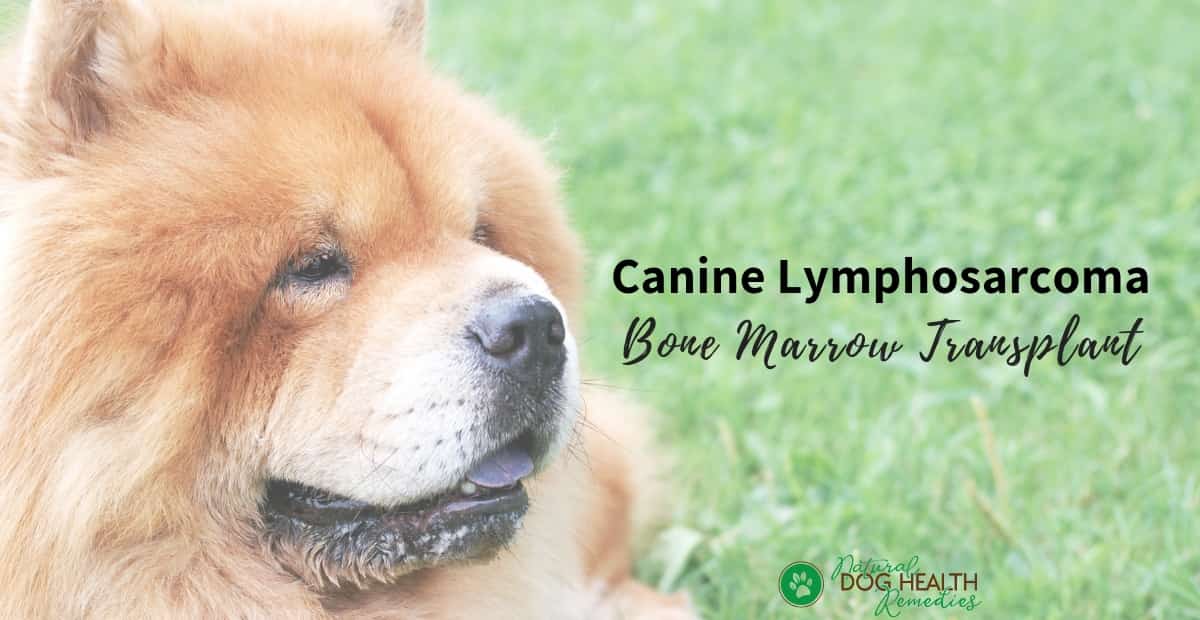Canine Lymphosarcoma Treatment
Bone Marrow Transplants

Overview
Canine lymphoma (or canine lymphosarcoma) is a malignant cancer of the lymphocytes, and since it involves the lymphatic system, surgery is not a treatment option.
Up until now, chemotherapy has been the treatment of choice. Unfortunately, chemo treatment has not had a great deal of success in curing lymphoma in dogs. Only about 2% (or less) of cases of canine lymphoma have reported curative success.
It is therefore great news that bone marrow transplant (BMT) treatment is available for dogs with lymphoma, although at this moment, BMT can only be performed in very limited facilities (see below).
(Access this page if you want more information on the symptoms, causes, and other treatment options of lymphosarcoma in dogs.)
Are All Dogs with Lymphoma Suitable for this Treatment?
Unfortunately, not all dogs with lymphoma are suitable for bone marrow transplants.
Dogs need to be first treated with chemotherapy so that they are in, or close to, complete remission. Only until they have reached this stage can they receive BMT treatment.
In addition, dogs who are too small (under 8 kg or 18 lbs) may have difficulties undergoing transplants.
Finally, dogs with existing health issues such as kidney or heart problems, or conditions that make infections more likely (e.g. diabetes, Cushing's disease) are not suitable candidates for bone marrow transplants.
Bone Marrow Transplant Procedures
Bone marrow transplant treatment follows several steps:
- Preparation: To prepare for the transplant, the dog has to be injected twice a day with a drug called Neupogen. The drug forces healthy stem cells into the bloodstream from the bone marrow so that they can be extracted.
The dog also has to be put on an extremely low-fat diet because lipids (fats) in the blood can make steam cell extraction difficult.
- Stem Cell Extraction: One week after the injections and low-fat diet, healthy stem cell can be extracted using a leukaphoresis machine, which takes about 6 hours.
- Radiation and Bone Marrow Transplant: The next day, full body radiation will be given to the dog so as to kill all the cancer cells in his bone marrow. Immediately after the radiation treatment, the stem cells harvested the day before are infused back into the bloodstream.
The entire process (stem cell extraction, radiation, and bone marrow transplant) is done under anesthesia or sedation; therefore, the dog does not feel any pain.
After the transplant, the dog has to be kept in an isolation ward in the facility for about 2 weeks.
Possible Side Effects of BMT
Immediately following the bone marrow transplant procedures, the dog patient may show the following side effect symptoms:
- Vomiting and diarrhea (caused by radiation) - these symptoms can be treated by medication.
- Internal bleeding (due to loss of platelets created by the bone marrow) - blood transfusions may be needed.
- Infection (increased chances of bacteria entering the bloodstream due to suppressed immune system) - antibiotics can be given to the dog prior to, as well as after, the procedure as a precaution.
Upon returning home after 2 weeks' isolation stay at the facility, the dog patient may show temporary signs of fatigue, tiredness, and may suffer from hair loss.
Costs and Success Rate
 The average cost is about US$14,500, which includes everything except intensive ICU care, blood transfusions, and other extra costs that may arise depending on the case.
The average cost is about US$14,500, which includes everything except intensive ICU care, blood transfusions, and other extra costs that may arise depending on the case.
As BMT is still a very new treatment for canine lymphosarcoma, there are no statistical numbers showing success and recovery rates.
However, like all treatments, not every dog treated with bone marrow transplants will be completely cured.
So far, most cases of relapses seem to have occurred in the first 4 months after the transplant. Those who do not have a relapse after 4 months have a higher chance of success. They are either completely cured or remain cancer-free for at least 2 years.
Facilities Where BMT Is Performed
Currently in the USA, bone marrow transplants for dogs can be performed at these facilities:
- North Carolina State University's College of Veterinary Medicine in Releigh (Dr. Steve Suter)
- Washington State University Veterinary School (Dr. Jeffrey Bryan)
- Bellingham Veterinary in Bellingham, Washington
- Gulf Coast Veterinary Specialists in Houston, Texas
- VCA West Los Angeles Animal Hospital in LA, California
- Veterinary Specialty Hospital in San Diego, California
- Veterinary Specialty Center of the Hudson Valley in Wappingers Falls, New York





